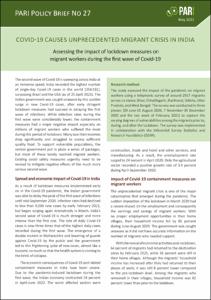Rothenberger, Paula; Gulati, Ashok; Jose, Shyma; Singh, B.B.: Covid-19 causes unprecedented Migrant Crisis in India : Assessing the impact of lockdown measures on migrant workers during the first wave of Covid-19. Bonn: Center for Development Research (ZEF), 2021. In: PARI Policy Brief, 27.
Online-Ausgabe in bonndoc: https://doi.org/10.48565/bonndoc-33
Online-Ausgabe in bonndoc: https://doi.org/10.48565/bonndoc-33
@techreport{handle:20.500.11811/9909,
doi: https://doi.org/10.48565/bonndoc-33,
author = {{Paula Rothenberger} and {Ashok Gulati} and {Shyma Jose} and {B.B. Singh}},
title = {Covid-19 causes unprecedented Migrant Crisis in India : Assessing the impact of lockdown measures on migrant workers during the first wave of Covid-19},
publisher = {Center for Development Research (ZEF)},
year = 2021,
month = may,
series = {PARI Policy Brief},
volume = 27,
note = {The second wave of Covid-19 is sweeping across India at an immense speed. India recorded the highest number of single-day Covid-19 cases in the world (354,531), surpassing Brazil and the USA (as of 25 April 2021). The Indian government was caught unaware by this sudden surge in new Covid-19 cases, after early stringent lockdown measures had succeed in delaying the first wave of infections. While infection rates during the first wave were considerably lower, the containment measures had a major negative impact especially on millions of migrant workers who suffered the most during this period of lockdown. Many saw their incomes drop significantly and struggled to access sufficient quality food. To support vulnerable populations, the central government put in place a series of packages, but most of these barely reached migrant workers. Existing social safety measures urgently need to be revised to mitigate negative effects of the much more serious second wave.},
url = {https://hdl.handle.net/20.500.11811/9909}
}
doi: https://doi.org/10.48565/bonndoc-33,
author = {{Paula Rothenberger} and {Ashok Gulati} and {Shyma Jose} and {B.B. Singh}},
title = {Covid-19 causes unprecedented Migrant Crisis in India : Assessing the impact of lockdown measures on migrant workers during the first wave of Covid-19},
publisher = {Center for Development Research (ZEF)},
year = 2021,
month = may,
series = {PARI Policy Brief},
volume = 27,
note = {The second wave of Covid-19 is sweeping across India at an immense speed. India recorded the highest number of single-day Covid-19 cases in the world (354,531), surpassing Brazil and the USA (as of 25 April 2021). The Indian government was caught unaware by this sudden surge in new Covid-19 cases, after early stringent lockdown measures had succeed in delaying the first wave of infections. While infection rates during the first wave were considerably lower, the containment measures had a major negative impact especially on millions of migrant workers who suffered the most during this period of lockdown. Many saw their incomes drop significantly and struggled to access sufficient quality food. To support vulnerable populations, the central government put in place a series of packages, but most of these barely reached migrant workers. Existing social safety measures urgently need to be revised to mitigate negative effects of the much more serious second wave.},
url = {https://hdl.handle.net/20.500.11811/9909}
}






